Astronomer's wife 范文
高考英语作文老外版 仰望星空,脚踏实地素材
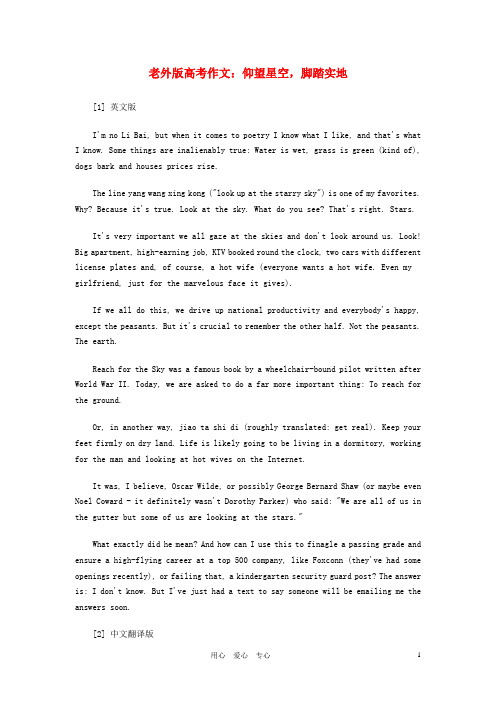
老外版高考作文:仰望星空,脚踏实地[1] 英文版I'm no Li Bai, but when it comes to poetry I know what I like, and that's what I know. Some things are inalienably true: Water is wet, grass is green (kind of), dogs bark and houses prices rise.The line yang wang xing kong ("look up at the starry sky") is one of my favorites. Why? Because it's true. Look at the sky. What do you see? That's right. Stars.It's very important we all gaze at the skies and don't look around us. Look! Big apartment, high-earning job, KTV booked round the clock, two cars with different license plates and, of course, a hot wife (everyone wants a hot wife. Even my girlfriend, just for the marvelous face it gives).If we all do this, we drive up national productivity and everybody's happy, except the peasants. But it's crucial to remember the other half. Not the peasants. The earth.Reach for the Sky was a famous book by a wheelchair-bound pilot written after World War II. Today, we are asked to do a far more important thing: To reach for the ground.Or, in another way, jiao ta shi di (roughly translated: get real). Keep your feet firmly on dry land. Life is likely going to be living in a dormitory, working for the man and looking at hot wives on the Internet.It was, I believe, Oscar Wilde, or possibly George Bernard Shaw (or maybe even Noel Coward - it definitely wasn't Dorothy Parker) who said: "We are all of us in the gutter but some of us are looking at the stars."What exactly did he mean? And how can I use this to finagle a passing grade and ensure a high-flying career at a top 500 company, like Foxconn (they've had some openings recently), or failing that, a kindergarten security guard post? The answer is: I don't know. But I've just had a text to say someone will be emailing me the answers soon.[2] 中文翻译版我不是李白,但谈及诗,我知道我喜欢什么。
用天文望远镜看月亮的英语作文
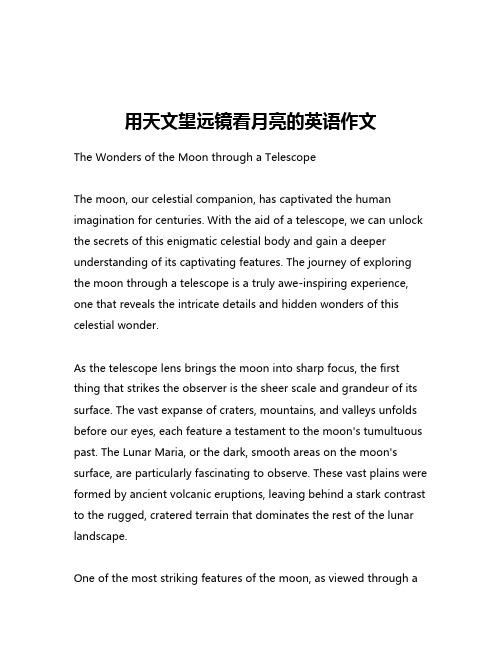
用天文望远镜看月亮的英语作文The Wonders of the Moon through a TelescopeThe moon, our celestial companion, has captivated the human imagination for centuries. With the aid of a telescope, we can unlock the secrets of this enigmatic celestial body and gain a deeper understanding of its captivating features. The journey of exploring the moon through a telescope is a truly awe-inspiring experience, one that reveals the intricate details and hidden wonders of this celestial wonder.As the telescope lens brings the moon into sharp focus, the first thing that strikes the observer is the sheer scale and grandeur of its surface. The vast expanse of craters, mountains, and valleys unfolds before our eyes, each feature a testament to the moon's tumultuous past. The Lunar Maria, or the dark, smooth areas on the moon's surface, are particularly fascinating to observe. These vast plains were formed by ancient volcanic eruptions, leaving behind a stark contrast to the rugged, cratered terrain that dominates the rest of the lunar landscape.One of the most striking features of the moon, as viewed through atelescope, is the intricate network of craters that dot its surface. These craters, ranging from small pockmarks to vast, gaping depressions, are the result of countless meteorite impacts over the course of the moon's history. Each crater tells a story, a record of the celestial bombardment that has shaped the moon's surface over billions of years. By observing these craters in detail, astronomers can gain valuable insights into the moon's geological history and the forces that have sculpted its surface.Another captivating aspect of the moon, as seen through a telescope, is the play of light and shadow across its surface. As the moon waxes and wanes, the angle of the sun's rays changes, casting dramatic shadows that accentuate the topography of the lunar landscape. The terminator, the boundary between the illuminated and dark portions of the moon, is particularly mesmerizing to observe, as it reveals the three-dimensional nature of the moon's surface features. The shadows cast by mountains and craters create a sense of depth and perspective, allowing the observer to truly appreciate the rugged and varied terrain of the moon.One of the most awe-inspiring moments in lunar observation comes during a lunar eclipse, when the moon passes through the Earth's shadow. As the moon is gradually obscured by the Earth's shadow, the surface takes on a deep, coppery hue, a phenomenon known as the "blood moon." This otherworldly display is a testament to theintricate dance of celestial bodies, and the telescope provides a front-row seat to this captivating event.Beyond the visual delights, observing the moon through a telescope also offers valuable scientific insights. By carefully studying the moon's surface, astronomers can gain a better understanding of the moon's geological history, its internal structure, and its relationship to the Earth. The craters, mountains, and other features on the moon's surface provide clues about the moon's formation and evolution, as well as the history of the solar system as a whole.Moreover, the study of the moon has practical applications here on Earth. The moon's gravitational pull is a key driver of the tides, and understanding the dynamics of this celestial relationship can have important implications for coastal communities and marine ecosystems. Additionally, the study of the moon's surface and its potential resources has implications for future space exploration and the potential colonization of the moon.In conclusion, the experience of observing the moon through a telescope is a truly remarkable and transformative one. The sheer scale and complexity of the lunar landscape, the interplay of light and shadow, and the insights into the moon's history and relationship to our planet all combine to create a captivating and awe-inspiring experience. Whether you are a seasoned astronomeror a curious stargazer, the moon's secrets, as revealed through the lens of a telescope, are sure to leave a lasting impression and inspire a deeper appreciation for the wonders of our celestial companion.。
Astronomers Wife

Setting
Mr. and Mrs. Ames belong to the upper class in society, and they live in a house where is very quiet but oppressive. Mrs. Ames always take the whole busying with her house works, and for her every day is the repetition of the day before. Her husband is an astronomer and dreamer. He always standing on the roof of the house or climbing up the peak of the hill, watching his astronomy world by telescope. Though Mrs. Ames lives a decent life materially, her life is very dull. She consider the astronomer the center of the world, and fears of disturbing him and bringing troubles to him. And they have no intersection in their marriage life. So, in such a condition, Mrs. Ames just can not gain what she want, and she lost herself gradually. Until one day a plumber comes to their house and exchange ideas with her, which evoke the internal aspiration of her.
The Astronomer’s Wife

Figures of Speech
Spoken soft as a willow weeping. (Alliteration) That man might be each time the new arching wave, and woman undertow that …(metaphor) Her husband was the mind, this other man the meat, of all mankind. (symbolism) The mystery and silence of her husband’s mind lay like a chiding finger…(simile) There’s a problem worthy of your mettle (irony)
Mr. Ames Passive Impractical Plumber Positive Practical
Indifferent
Idle Sense Go up
Kind
Laborious Sensibility Go down
The Change of the Plumber’s Attitude
The Astronomer’s Wife
Mrs. Ames Positive/optimistic Mr. Ames passive/pessimistic
Practical
Kind Laborious
Impractical
Indifferent Idle
The Astronomer’s Wife
Short Stories Wedding Day and Other Stories The First Lover and Other Stories The White Horses of Vienna ( O. Henry Award) The Astronomer's Wife Defeat ( O. Henry Award)
review on astronomer
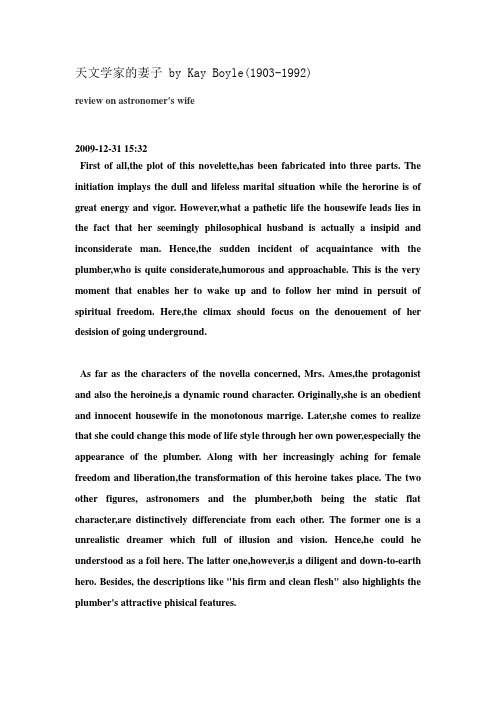
天文学家的妻子 by Kay Boyle(1903-1992)review on astronomer's wife2009-12-31 15:32First of all,the plot of this novelette,has been fabricated into three parts. The initiation implays the dull and lifeless marital situation while the herorine is of great energy and vigor. However,what a pathetic life the housewife leads lies in the fact that her seemingly philosophical husband is actually a insipid and inconsiderate man. Hence,the sudden incident of acquaintance with the plumber,who is quite considerate,humorous and approachable. This is the very moment that enables her to wake up and to follow her mind in persuit of spiritual freedom. Here,the climax should focus on the denouement of her desision of going underground.As far as the characters of the novella concerned, Mrs. Ames,the protagonist and also the heroine,is a dynamic round character. Originally,she is an obedient and innocent housewife in the monotonous marrige. Later,she comes to realize that she could change this mode of life style through her own power,especially the appearance of the plumber. Along with her increasingly aching for female freedom and liberation,the transformation of this heroine takes place. The two other figures, astronomers and the plumber,both being the static flat character,are distinctively differenciate from each other. The former one is a unrealistic dreamer which full of illusion and vision. Hence,he could he understood as a foil here. The latter one,however,is a diligent and down-to-earth hero. Besides, the descriptions like "his firm and clean flesh" also highlights the plumber's attractive phisical features.As for the theme,undoubtedly,should lie in the drastic conflicts between Mrs. Armes' healthy and integrated life style and the realistic life she's leading at present. Given this,the plumber and Mr Armes,stands for the two types of life style,say,sense and sensability. Mrs Armes,initially,as the victim of patriarchy and female discrimination,later awakens as a typical spokesman for the self-dependant and self-reliant female,and eventually,she achieves her femininity through the strengh of her inside struggle and belief. Meanwhile,this short story could be undoubtedly understood as the females' breaking with the past,changing the repressed and eppressed women's fate.天文学家的妻子 by Kay Boyle(1903-1992)当万籁俱寂,生命尚未复苏时,醒来那一刻是令人不悦的。
The Astronomer’s Wife
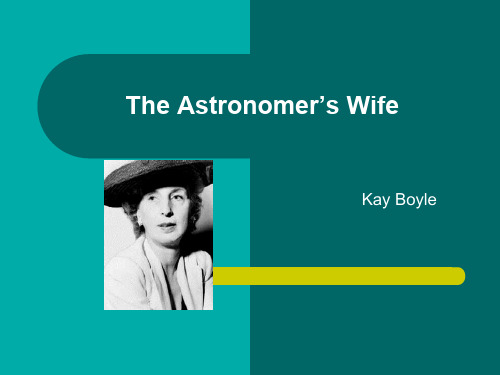
Kay Boyle
Kay Boyle
Kay Boyle(1903-1992), American writer, educator and political activist, a member of the famous Lost Generation of American artists and writers who inhabited Paris in the 1920s Famous for her short stories Concentrates on the double alienation of women and especially on middle-class women's difficulty in finding fulfillment
Setting and Atmosphere
It is an ordinary early morning in a dull and lifeless marital situation, in contrast to Mrs. Ames’ energy and vigor, in the house where villas are scattered out few and primitive.
Figures of Speech
Spoken soft as a willow weeping. (Alliteration) That man might be each time the new arching wave, and woman undertow that …(metaphor) Her husband was the mind, this other man the meat, of all mankind. (symbolism) The mystery and silence of her husband’s mind lay like a chiding finger…(simile) There’s a problem worthy of your mettle (irony)
Glossary of Literary Terms
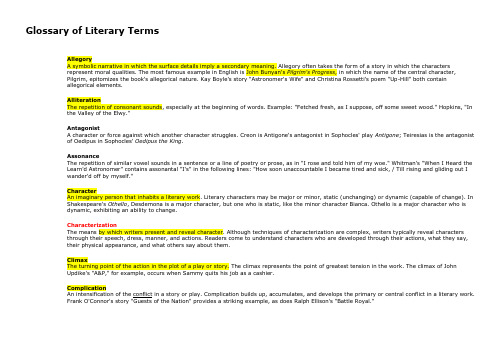
Glossary of Literary TermsAllegoryA symbolic narrative in which the surface details imply a secondary meaning. Allegory often takes the form of a story in which the charactersrepresent moral qualities. The most famous example in English is John Bunyan's Pilgrim's Progress, in which the name of the central character,Pilgrim, epitomizes the book's allegorical nature. Kay Boyle's story "Astronomer's Wife" and Christina Rossetti's poem "Up-Hill" both containallegorical elements.AlliterationThe repetition of consonant sounds, especially at the beginning of words. Example: "Fetched fresh, as I suppose, off some sweet wood." Hopkins, "In the Valley of the Elwy."AntagonistA character or force against which another character struggles. Creon is Antigone's antagonist in Sophocles' play Antigone; Teiresias is the antagonistof Oedipus in Sophocles' Oedipus the King.AssonanceThe repetition of similar vowel sounds in a sentence or a line of poetry or prose, as in "I rose and told him of my woe." Whitman's "When I Heard the Learn'd Astronomer" contains assonantal "I's" in the following lines: "How soon unaccountable I became tired and sick, / Till rising and gliding out Iwander'd off by myself."CharacterAn imaginary person that inhabits a literary work. Literary characters may be major or minor, static (unchanging) or dynamic (capable of change). In Shakespeare's Othello, Desdemona is a major character, but one who is static, like the minor character Bianca. Othello is a major character who isdynamic, exhibiting an ability to change.CharacterizationThe means by which writers present and reveal character. Although techniques of characterization are complex, writers typically reveal charactersthrough their speech, dress, manner, and actions. Readers come to understand characters who are developed through their actions, what they say,their physical appearance, and what others say about them.ClimaxThe turning point of the action in the plot of a play or story. The climax represents the point of greatest tension in the work. The climax of JohnUpdike's "A&P," for example, occurs when Sammy quits his job as a cashier.ComplicationAn intensification of the conflict in a story or play. Complication builds up, accumulates, and develops the primary or central conflict in a literary work.Frank O'Connor's story "Guests of the Nation" provides a striking example, as does Ralph Ellison's "Battle Royal."ConflictA struggle between opposing forces in a story or play, usually resolved by the end of the work. The conflict may occur within a character as well as between characters. Lady Gregory's one-act play The Rising of the Moon exemplifies both types of conflict as the Policeman wrestles with his conscience in an inner conflict and confronts an antagonist in the person of the ballad singer.ConventionA customary feature of a literary work, such as the use of a chorus in Greek tragedy, the inclusion of an explicit moral in a fable, or the use of a particular rhyme scheme in a villanelle. Literary conventions are defining features of particular literary genres, such as novel, short story, ballad, sonnet, and play.DenouementThe resolution of the plot of a literary work. It involves the “tying up of loose ends.” The denouement of Hamlet takes place after the catastrophe, with the stage littered with corpses. During the denouement Fortinbras makes an entrance and a speech, and Horatio speaks his sweet lines in praise of Hamlet.DialogueThe conversation of characters in a literary work. In fiction, dialogue is typically enclosed within quotation marks. In plays, characters' speech is preceded by their names.DictionThe selection of words in a literary work. A work's diction forms one of its centrally important literary elements, as writers use words to convey action, reveal character, imply attitudes, identify themes, and suggest values. We can speak of the diction particular to a character, as in Iago's and Desdemona's very different ways of speaking in Othello. We can also refer to a poet's diction as represented over the body of his or her work, as in Donne's or Hughes's diction.ExpositionThe first stage of a fictional or dramatic plot, in which necessary background information is provided. Ibsen's A Doll's House, for instance, begins with a conversation between the two central characters, a dialogue that fills the audience in on events that occurred before the action of the play begins, but which are important in the development of its plot.FableA brief story with an explicit moral provided by the author. Fables typically include animals as characters. Their most famous practitioner in the west is the ancient Greek writer Aesop, whose "The Dog and the Shadow" and "The Wolf and the Mastiff" are included in this book.Falling actionIn the plot of a story or play, the action following the climax of the work that moves it towards its denouement or resolution. The falling action of Othello begins after Othello realizes that Iago is responsible for plotting against him by spurring him on to murder his wife, Desdemona.FictionAn imagined story, whether in prose, poetry, or drama. Ibsen's Nora is fictional, a "make-believe" character in a play, as are Hamlet and Othello. Characters like Robert Browning's Duke and Duchess from his poem "My Last Duchess" are fictional as well, though they may be based on actual historical individuals. And, of course, characters in stories and novels are fictional, though they, too, may be based, in some way, on real people. The important thing to remember is that writers embellish and embroider and alter actual life when they use real life as the basis for their work. They fictionalize facts, and deviate from real-life situations as they "make things up."Figurative languageA form of language use in which writers and speakers convey something other than the literal meaning of their words. Examples include hyperbole or exaggeration, litotes or understatement, simile and metaphor, which employ comparison, and synecdoche and metonymy, in which a part of a thing stands for the whole.FlashbackAn interruption of a work's chronology to describe or present an incident that occurred prior to the main time frame of a work's action. Writers use flashbacks to complicate the sense of chronology in the plot of their works and to convey the richness of the experience of human time. Faulkner's story "A Rose for Emily" includes flashbacks.FoilA character who contrasts and parallels the main character in a play or story. Laertes, in Hamlet, is a foil for the main character; in Othello, Emilia and Bianca are foils for Desdemona.ForeshadowingHints of what is to come in the action of a play or a story. Ibsen's A Doll's House includes foreshadowing as does Synge's Riders to the Sea. So, too, do Poe's "Cask of Amontillado" and Chopin's "Story of an Hour."HyperboleA figure of speech involving exaggeration. John Donne uses hyperbole in his poem: "Song: Go and Catch a Falling Star."ImageryThe pattern of related comparative aspects of language, particularly of images, in a literary work. Imagery of light and darkness pervade James Joyce's stories "Araby," "The Boarding House," and "The Dead." So, too, does religious imagery.IronyA contrast or discrepancy between what is said and what is meant or between what happens and what is expected to happen in life and in literature. In verbal irony, characters say the opposite of what they mean. In irony of circumstance or situation, the opposite of what is expected occurs. In dramatic irony, a character speaks in ignorance of a situation or event known to the audience or to the other characters. Flannery O'Connor's short stories employ all these forms of irony, as does Poe's "Cask of Amontillado."MetaphorA comparison between essentially unlike things without an explicitly comparative word such as like or as. An example is "My love is a red, red rose,"MetonymyA figure of speech in which a closely related term is substituted for an object or idea. An example: "We have always remained loyal to the crown." See Synecdoche.NarratorThe voice and implied speaker of a fictional work, to be distinguished from the actual living author. For example, the narrator of Joyce's "Araby" is not James Joyce himself, but a literary fictional character created expressly to tell the story. Faulkner's "A Rose for Emily" contains a communal narrator, identified only as "we." See Point of view.OnomatopoeiaThe use of words to imitate the sounds they describe. Words such as buzz and crack are onomatopoetic. The following line from Pope's "Sound and Sense" onomatopoetically imitates in sound what it describes:When Ajax strives some rock's vast weight to throw,The line too labors, and the words move slow.Most often, however, onomatopoeia refers to words and groups of words, such as Tennyson's description of the "murmur of innumerable bees," which attempts to capture the sound of a swarm of bees buzzing.ParableA brief story that teaches a lesson often ethical or spiritual. Examples include "The Prodigal Son," from the New Testament, and the Zen parable, "Learning to Be Silent." See Fable.ParodyA humorous, mocking imitation of a literary work, sometimes sarcastic, but often playful and even respectful in its playful imitation. Examples include Bob McKenty's parody of Frost's "Dust of Snow" and Kenneth Koch's parody of Williams's "This is Just to Say."PersonificationThe endowment of inanimate objects or abstract concepts with animate or living qualities. An example: "The yellow leaves flaunted their color gaily in the breeze." Wordsworth's "I wandered lonely as a cloud" includes personification.PlotThe unified structure of incidents in a literary work. See Conflict, Climax, Denouement, and Flashback.Point of viewThe angle of vision from which a story is narrated. See Narrator. A work's point of view can be: first person, in which the narrator is a character or an observer, respectively; objective, in which the narrator knows or appears to know no more than the reader; omniscient, in which the narrator knows everything about the characters; and limited omniscient, which allows the narrator to know some things about the characters but not everything.ProtagonistThe main character of a literary work--Hamlet and Othello in the plays named after them, Gregor Samsa in Kafka's Metamorphosis, Paul in Lawrence's "Rocking-Horse Winner."RecognitionThe point at which a character understands his or her situation as it really is. Sophocles' Oedipus comes to this point near the end of Oedipus the King; Othello comes to a similar understanding of his situation in Act V of Othello.ResolutionThe sorting out or unraveling of a plot at the end of a play, novel, or story. It is also called the denouement. See Plot.ReversalThe point at which the action of the plot turns in an unexpected direction for the protagonist. Oedipus's and Othello's recognitions are also reversals. They learn what they did not expect to learn. See Recognition and also Irony.Rising actionA set of conflicts and crises that constitute the part of a play's or story's plot leading up to the climax. See Climax, Denouement, and Plot.SatireA literary work that criticizes human misconduct and ridicules vices, stupidities, and follies. Swift's Gulliver's Travels is a famous example. Chekhov's Marriage Proposal and O'Connor's "Everything That Rises Must Converge," have strong satirical elements.SettingThe time and place of a literary work that establish its context. The stories of Sandra Cisneros are set in the American southwest in the mid to late 20th century, those of James Joyce in Dublin, Ireland in the early 20th century.SimileA figure of speech involving a comparison between unlike things using like, as, or as though. An example: "My love is like a red, red rose."StyleThe way an author chooses words, arranges them in sentences or in lines of dialogue or verse, and develops ideas and actions with description, imagery, and other literary techniques. See Connotation, Denotation, Diction, Figurative language, Image, Imagery, Irony, Metaphor, Narrator, Point of view, Syntax, and Tone.SubjectWhat a story or play is about; to be distinguished from plot and theme. Faulkner's "A Rose for Emily" is about the decline of a particular way of life endemic to the American south before the civil war. That is its subject/topic. Its plot concerns how Faulkner describes and organizes the actions of the story's characters. Its theme is the overall meaning Faulkner conveys.SubplotA subsidiary or subordinate or parallel plot in a play or story that coexists with the main plot. The story of Rosencrantz and Guildenstern forms a subplot with the overall plot of Hamlet.SymbolAn object or action in a literary work that means more than itself, that stands for something beyond itself. The glass unicorn in The Glass Menagerie, the rocking horse in "The Rocking-Horse Winner," the road in Frost's "The Road Not Taken"--all are symbols in this sense.SynecdocheA figure of speech in which a part is substituted for the whole. An example: "Lend me a hand." See Metonymy.SyntaxThe grammatical order of words in a sentence or line of verse or dialogue. The organization of words and phrases and clauses in sentences of prose, verse, and dialogue. In the following example, normal syntax (subject, verb, object order) is inverted:"Whose woods these are I think I know."ThemeThe idea or message of a literary work abstracted from its details of language, character, and action, and cast in the form of a generalization. Theme must be stated in a sentence. It is not simply a topic.ToneThe implied attitude of a writer toward the subject and characters of a work, as, for example, Flannery O'Connor's ironic tone in her "Good Country People." See Irony.UnderstatementA figure of speech in which a writer or speaker says less than what he or she means; the opposite of exaggeration. The last line of Frost's "Birches" illustrates this literary device: "One could do worse than be a swinger of birches."。
thecharacteranalyzeofastronomerswife
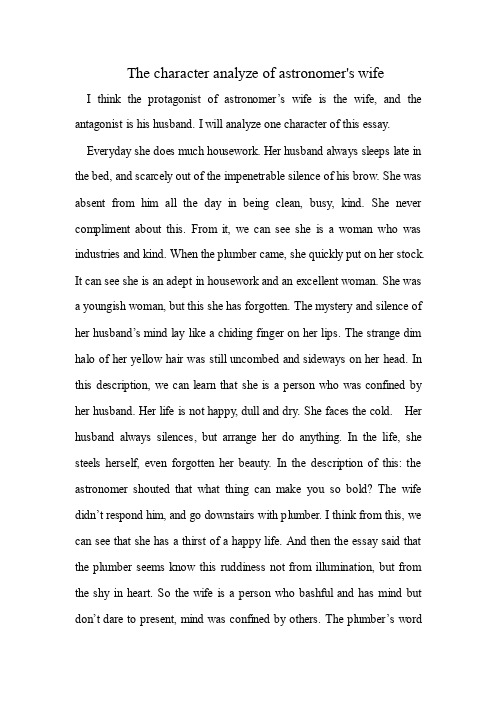
The character analyze of astronomer's wifeI think the protagonist of astronomer’s wife is the wife, and the antagonist is his husband. I will analyze one character of this essay. Everyday she does much housework. Her husband always sleeps late in the bed, and scarcely out of the impenetrable silence of his brow. She was absent from him all the day in being clean, busy, kind. She never compliment about this. From it, we can see she is a woman who was industries and kind. When the plumber came, she quickly put on her stock. It can see she is an adept in housework and an excellent woman. She was a youngish woman, but this she has forgotten. The mystery and silence of her husband’s mind lay like a chiding finger on her lips. The strange dim halo of her yellow hair was still uncombed and sideways on her head. In this description, we can learn that she is a person who was confined by her husband. Her life is not happy, dull and dry. She faces the cold. Her husband always silences, but arrange her do anything. In the life, she steels herself, even forgotten her beauty. In the description of this: the astronomer shouted that what thing can make you so bold? The wife didn’t respond him, and go downstairs with plumber. I think from this, we can see that she has a thirst of a happy life. And then the essay said that the plumber seems know this ruddiness not from illumination, but from the shy in heart. So the wife is a person who bashful and has mind but don’t dare to present, mind was confined by others. The plumber’s worddeeply moved her; it made her wonder that why she didn’t have sense when her husband speaks of the high. It seems that she like the life style as plumber more. She doesn’t want her hand busy one more. She feels curious about the plumbers’ word, she believe his words.。
Astronomer's wife
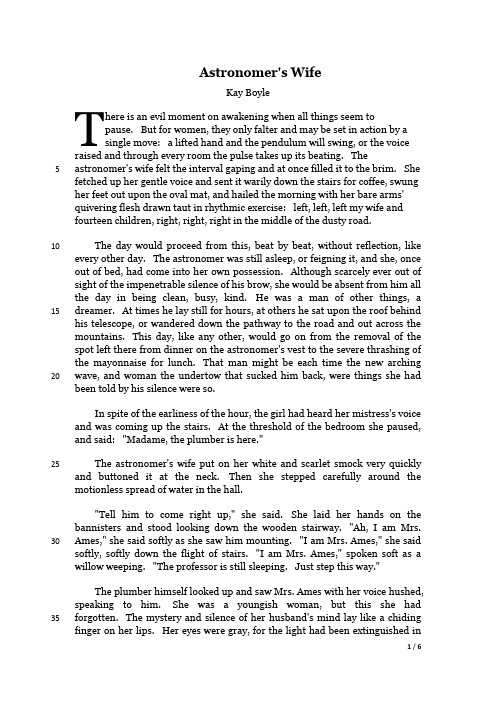
Astronomer's WifeKay BoyleThere is an evil moment on awakening when all things seem topause. But for women, they only falter and may be set in action by asingle move: a lifted hand and the pendulum will swing, or the voice raised and through every room the pulse takes up its beating. Theastronomer's wife felt the interval gaping and at once filled it to the brim. She 5fetched up her gentle voice and sent it warily down the stairs for coffee, swung her feet out upon the oval mat, and hailed the morning with her bare arms'quivering flesh drawn taut in rhythmic exercise: left, left, left my wife andfourteen children, right, right, right in the middle of the dusty road.The day would proceed from this, beat by beat, without reflection, like 10every other day. The astronomer was still asleep, or feigning it, and she, once out of bed, had come into her own possession. Although scarcely ever out of sight of the impenetrable silence of his brow, she would be absent from him all the day in being clean, busy, kind. He was a man of other things, a dreamer. At times he lay still for hours, at others he sat upon the roof behind 15his telescope, or wandered down the pathway to the road and out across the mountains. This day, like any other, would go on from the removal of the spot left there from dinner on the astronomer's vest to the severe thrashing of the mayonnaise for lunch. That man might be each time the new arching wave, and woman the undertow that sucked him back, were things she had 20been told by his silence were so.In spite of the earliness of the hour, the girl had heard her mistress's voice and was coming up the stairs. At the threshold of the bedroom she paused, and said: "Madame, the plumber is here."The astronomer's wife put on her white and scarlet smock very quickly 25and buttoned it at the neck. Then she stepped carefully around the motionless spread of water in the hall."Tell him to come right up," she said. She laid her hands on the bannisters and stood looking down the wooden stairway. "Ah, I am Mrs.Ames," she said softly as she saw him mounting. "I am Mrs. Ames," she said 30softly, softly down the flight of stairs. "I am Mrs. Ames," spoken soft as a willow weeping. "The professor is still sleeping. Just step this way."The plumber himself looked up and saw Mrs. Ames with her voice hushed, speaking to him. She was a youngish woman, but this she had forgotten. The mystery and silence of her husband's mind lay like a chiding 35finger on her lips. Her eyes were gray, for the light had been extinguished inthem. The strange dim halo of her yellow hair was still uncombed and sideways on her head.For all of his heavy boots, the plumber quieted the sound of his feet, and together they went down the hall, picking their way around the still lake of 40water that spread as far as the landing and lay docile there. The plumber wasa tough, hardy man; but he took off his hat when he spoke to her and lookedher fully, almost insolently in the eye."Does it come from the wash-basin," he said, "or from the other . . .?""Oh, from the other," said Mrs. Ames without hesitation.45In this place the villas were scattered out few and primitive, and although beauty lay without there was no reflection of her face within. Here all was awkward and unfit; a sense of wrestling with uncouth forces gave everything an austere countenance. Even the plumber, dealing as does a woman with matters under hand, was grave and stately. The mountains round about 50seemed to have cast them into the shadow of great dignity.Mrs. Ames began speaking of their arrival that summer in the little villa, mourning each event as it followed on the other."Then, just before going to bed last night," she said, "I noticed something was unusual."55The plumber cast down a folded square of sack-cloth on the brimming floor and laid his leather apron on it. Then he stepped boldly onto the heart of the island it shaped and looked long into the overflowing bowl."The water should be stopped from the meter in the garden," he said at last.60"Oh, I did that," said Mrs. Ames, "the very first thing last night. I turned it off at once, in my nightgown, as soon as I saw what was happening. But all this had already run in."The plumber looked for a moment at her red kid slippers. She was standing just at the edge of the clear, pure-seeming tide.65"It's no doubt the soil lines," he said severely. "It may be that something has stopped them, but my opinion is that the water seals aren't working. That's the trouble often enough in such cases. If you had a valve you wouldn't be caught like this."Mrs. Ames did not know how to meet this rebuke. She stood, swaying a 70little, looking into the plumber's blue relentless eye."I'm sorry--I'm sorry that my husband," she said, "is still--resting and cannot go into this with you. I'm sure it must be very interesting. . . .""You'll probably have to have the traps sealed," said the plumber grimly, and at the sound of this Mrs. Ames' hand flew in dismay to the side of her 75face. The plumber made no move, but the set of his mouth as he looked at her seemed to soften. "Anyway, I'll have a look from the garden end," he said."Oh, do," said the astronomer's wife in relief. Here was a man who spoke of action and object as simply as women did! But however hushed her voice had been, it carried clearly to Professor Ames who lay, dreaming and solitary, 80upon his bed. He heard their footsteps come down the hall, pause, and skip across the pool of overflow."Katherine!" said the astronomer in a ringing tone. "There's a problem worthy of your mettle!"Mrs. Ames did not turn her head, but led the plumber swiftly down the 85stairs. When the sun in the garden struck her face, he saw there was a wave of color in it, but this may have been anything but shame."You see how it is," said the plumber, as if leading her mind away. "The drains run from these houses right down the hill, big enough for a man to stand upright in them, and clean as a whistle, too." There they stood in the 90garden with the vegetation flowering in disorder all about. The plumber looked at the astronomer's wife. "They come out at the torrent on the other side of the forest beyond there," he said.But the words the astronomer had spoken still sounded in her in despair. The mind of man, she knew, made steep and sprightly flights, 95pursued illusion, took foothold in the nameless things that cannot pass between the thumb and finger. But whenever the astronomer gave voice to the thoughts that soared within him, she returned in gratitude to the long expanses of his silence. Desert-like they stretched behind and before the articulation of his scorn.100Life, life is an open sea, she sought to explain it in sorrow, and to survive women cling to the floating debris on the tide. But the plumber had suddenly fallen upon his knees in the grass and had crooked his fingers through the ring of the drains' trap-door. When she looked down she saw that he was looking up into her face, and she saw too that his hair was as light as gold.105"Perhaps Mr. Ames," he said rather bitterly, "would like to come down with me and have a look around?""Down?" said Mrs. Ames in wonder."Into the drains," said the plumber brutally. "They're a study for a man who likes to know what's what."110"Oh, Mr. Ames," said Mrs. Ames in confusion. "He's still—still in bed, you see."The plumber lifted his strong, weathered face and looked curiously at her. Surely it seemed to him strange for a man to linger in bed, with the sun pouring yellow as wine all over the place. The astronomer's wife saw his lean 115cheeks, his high, rugged bones, and the deep seams in his brow. His flesh was as firm and clean as wood, stained richly tan with the climate's rigor. His fingers were blunt, but comprehensible to her, gripped in the ring and holding the iron door wide. The backs of his hands were bound round and round with ripe blue veins of blood.120"At any rate," said the astronomer's wife, and the thought of it moved her lips to smile a little, "Mr. Ames would never go down there alive. He likes going up," she said. And she, in her turn, pointed, but impudently, towards the heavens. "On the roof. Or on the mountains. He's been up on the top of them many times."125"It's a matter of habit," said the plumber, and suddenly he went down the trap. Mrs. Ames saw a bright little piece of his hair still shining, like a star, long after the rest of him had gone. Out of the depths, his voice, hollow and dark with foreboding, returned to her. "I think something has stopped the elbow," was what he said.130This was speech that touched her flesh and bone and made her wonder. When her husband spoke of height, having no sense of it, she could not picture it nor hear. Depth or magic passed her by unless a name were given. But madness in a daily shape, as elbow stopped, she saw clearly and well. She sat down on the grasses, bewildered that it should be a man who 135had spoken to her so.She saw the weeds springing up, and she did not move to tear them up from life. She sat powerless, her sense veiled, with no action taking shape beneath her hands. In this way some men sat for hours on end, she knew, tracking a single thought back to its origin. The mind of man could balance 140and divide, weed out, destroy. She sat on the full, burdened grasses, seeking to think, and dimly waiting for the plumber to return.Whereas her husband had always gone up, as the dead go, she knew now that there were others who went down, like the corporeal being of the dead. That men were then divided into two bodies now seemed clear to Mrs. 145Ames. This knowledge stunned her with its simplicity and took the uneasy motion from her limbs. She could not stir, but sat facing the mountains' rocky flanks, and harking in silence to lucidity. Her husband was the mind, this other man the meat, of all mankind.After a little, the plumber emerged from the earth: first the light top of 150his head, then the burnt brow, and then the blue eyes fringed with whitest lash. He braced his thick hands flat on the pavings of the garden-path and swung himself completely from the pit."It's the soil lines," he said pleasantly. "The gases," he said as he looked down upon her lifted face, "are backing up the drains."155"What in the world are we going to do?" said the astronomer's wife softly.There was a young and strange delight in putting questions to which true answers would be given. Everything the astronomer had ever said to her wasa continuous query to which there could be no response."Ah, come, now," said the plumber, looking down and smiling. "There's a 160remedy for every ill, you know. Sometimes it may be that," he said as if speaking to a child, "or sometimes the other thing. But there's always a help for everything amiss."Things come out of herbs and make you young again, he might have been saying to her; or the first good rain will quench any drought; or time of itself 165will put a broken bone together."I'm going to follow the ground pipe out right to the torrent," the plumber was saying. "The trouble's between here and there and I'll find it on the way. There's nothing at all that can't be done over for the caring," he was saying, and his eyes were fastened on her face in insolence, or gentleness, or 170love.The astronomer's wife stood up, fixed a pin in her hair, and turned around towards the kitchen. Even while she was calling the servant's name, the plumber began speaking again."I once had a cow that lost her cud," the plumber was saying. The girl 175came out on the kitchen-step and Mrs. Ames stood smiling at her in the sun."The trouble is very serious, very serious," she said across the garden. "When Mr. Ames gets up, please tell him I've gone down."She pointed briefly to the open door in the pathway, and the plumber hoisted his kit on his arm and put out his hand to help her down.180"But I made her another in no time," he was saying, "out of flowers and things and what-not.""Oh," said the astronomer's wife in wonder as she stepped into the heart of the earth. She took his arm, knowing that what he said was true.185Topics for Discussion1. How is the relationship between Mr. and Mrs. Ames? Find details tosupport your statement.2. The story revolves around two sets of character contrasts: wife versushusband; plumber versus astronomer. Try to describe the differences ofthe three characters.3. What is the implication in the ending of the story?。
我的偶像叶光富英语作文
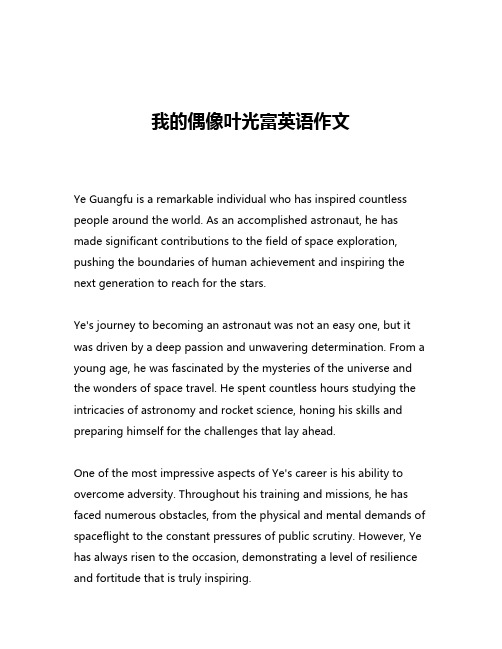
我的偶像叶光富英语作文Ye Guangfu is a remarkable individual who has inspired countless people around the world. As an accomplished astronaut, he has made significant contributions to the field of space exploration, pushing the boundaries of human achievement and inspiring the next generation to reach for the stars.Ye's journey to becoming an astronaut was not an easy one, but it was driven by a deep passion and unwavering determination. From a young age, he was fascinated by the mysteries of the universe and the wonders of space travel. He spent countless hours studying the intricacies of astronomy and rocket science, honing his skills and preparing himself for the challenges that lay ahead.One of the most impressive aspects of Ye's career is his ability to overcome adversity. Throughout his training and missions, he has faced numerous obstacles, from the physical and mental demands of spaceflight to the constant pressures of public scrutiny. However, Ye has always risen to the occasion, demonstrating a level of resilience and fortitude that is truly inspiring.During his time as an astronaut, Ye has undertaken numerous missions, each one more challenging and awe-inspiring than the last. He has conducted experiments, performed complex maneuvers, and even conducted spacewalks, all while maintaining a calm and composed demeanor that has earned him the respect and admiration of his peers.But Ye's impact extends far beyond his achievements in space. He is also a passionate advocate for STEM education, using his platform to inspire young people around the world to pursue careers in science, technology, engineering, and mathematics. Through his public appearances, educational outreach programs, and media interviews, Ye has become a role model for countless individuals who aspire to follow in his footsteps.One of the most remarkable things about Ye is his humility and dedication to his craft. Despite his many accolades and accomplishments, he remains grounded and focused on the task at hand, always striving to learn and improve. He is a true embodiment of the values that define the best of humanity – curiosity, perseverance, and a relentless pursuit of knowledge.As I reflect on Ye's life and career, I am struck by the profound impact that he has had on the world around him. Through hisachievements in space exploration, his dedication to education and outreach, and his unwavering commitment to excellence, he has become a true inspiration to people of all ages and backgrounds.In a world that is often dominated by divisiveness and cynicism, Ye's story serves as a powerful reminder of the transformative power of human potential. He has shown us that with the right mindset, the right tools, and the right support, we can achieve remarkable things – not just for ourselves, but for the betterment of all humanity.As I continue to follow Ye's career and the incredible work that he is doing, I am filled with a sense of awe and admiration. He is a true hero in the truest sense of the word, and his legacy will continue to inspire generations to come. Whether you are a aspiring astronaut, a STEM educator, or simply someone who is fascinated by the wonders of the universe, Ye Guangfu is a role model whose story is worth celebrating and sharing with the world.。
移居月球英文作文100

移居月球英文作文100下载温馨提示:该文档是我店铺精心编制而成,希望大家下载以后,能够帮助大家解决实际的问题。
文档下载后可定制随意修改,请根据实际需要进行相应的调整和使用,谢谢!并且,本店铺为大家提供各种各样类型的实用资料,如教育随笔、日记赏析、句子摘抄、古诗大全、经典美文、话题作文、工作总结、词语解析、文案摘录、其他资料等等,如想了解不同资料格式和写法,敬请关注!Download tips: This document is carefully compiled by theeditor. I hope that after you download them,they can help yousolve practical problems. The document can be customized andmodified after downloading,please adjust and use it according toactual needs, thank you!In addition, our shop provides you with various types ofpractical materials,such as educational essays, diaryappreciation,sentence excerpts,ancient poems,classic articles,topic composition,work summary,word parsing,copyexcerpts,other materials and so on,want to know different data formats andwriting methods,please pay attention!I moved to the moon last month. It was a big decision, but I felt like it was the right thing to do. The moon is a fascinating place, full of mysteries and wonders. Living here is like living in a completely different world.The first thing I noticed when I arrived on the moon was the lack of gravity. It was strange at first, but I quickly got used to it. Walking on the moon feels like floating, and it's a lot of fun. I can jump really high and do flips in the air. It's like being in a constant state of weightlessness.The landscape on the moon is breathtaking. The surface is covered in craters and mountains, and there are vast stretches of barren land. It's a stark contrast to the lush greenery of Earth. But there is a certain beauty in the desolation. The moon has its own unique charm that I can't find anywhere else.Living on the moon has its challenges. The lack of atmosphere means that there is no air to breathe. I have to wear a spacesuit whenever I go outside. It's bulky and uncomfortable, but it's necessary for survival. The moon is also very cold, with temperatures dropping to extreme lows.I have to bundle up in layers of warm clothing to stay warm.One of the things I love about living on the moon isthe peace and quiet. There are no cars honking, no sirens blaring, and no noisy neighbors. It's just me and the silence. It's a great place to relax and unwind. I can sit outside and gaze at the stars, or take long walks in the moonlight. It's a peaceful existence that I cherish.Living on the moon has opened my eyes to the vastnessof the universe. It's a humbling experience to be surrounded by the vastness of space. I feel small and insignificant in comparison. But at the same time, it's empowering to know that I am part of something so much bigger than myself.In conclusion, moving to the moon has been a life-changing experience. It has given me a new perspective on life and the universe. Living here is not without its challenges, but it's also filled with wonder and beauty. I am grateful for the opportunity to call the moon my home.。
星际远航作文英语
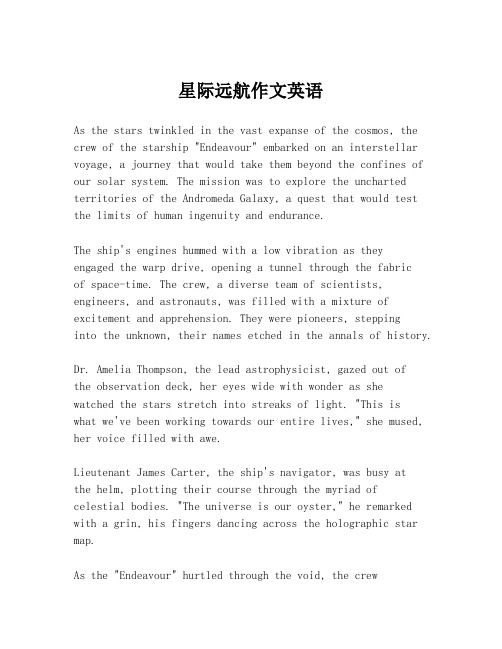
星际远航作文英语As the stars twinkled in the vast expanse of the cosmos, the crew of the starship "Endeavour" embarked on an interstellar voyage, a journey that would take them beyond the confines of our solar system. The mission was to explore the uncharted territories of the Andromeda Galaxy, a quest that would test the limits of human ingenuity and endurance.The ship's engines hummed with a low vibration as they engaged the warp drive, opening a tunnel through the fabricof space-time. The crew, a diverse team of scientists, engineers, and astronauts, was filled with a mixture of excitement and apprehension. They were pioneers, steppinginto the unknown, their names etched in the annals of history.Dr. Amelia Thompson, the lead astrophysicist, gazed out ofthe observation deck, her eyes wide with wonder as shewatched the stars stretch into streaks of light. "This iswhat we've been working towards our entire lives," she mused, her voice filled with awe.Lieutenant James Carter, the ship's navigator, was busy atthe helm, plotting their course through the myriad ofcelestial bodies. "The universe is our oyster," he remarked with a grin, his fingers dancing across the holographic star map.As the "Endeavour" hurtled through the void, the crewencountered strange new worlds and phenomena. They witnessed the birth of stars in a nebula's fiery embrace, and the death of giants as supernovae illuminated the darkness. They marveled at the icy rings of a distant planet, and the shimmering auroras that danced in the skies of another.The journey was not without its challenges. The ship facedthe perils of asteroid fields, the deadly pull of black holes, and the enigmatic silence of the void. Yet, the crew persevered, their spirit undaunted by the vastness of the universe.As the mission progressed, the "Endeavour" discovered signsof extraterrestrial life, a revelation that sent ripples of excitement throughout the ship. The discovery of microbiallife on a distant exoplanet was a monumental achievement, one that would forever change humanity's understanding of itsplace in the cosmos.The interstellar voyage was a testament to the indomitable spirit of exploration. It was a journey not just through space, but through the human soul, a quest for knowledge that spanned the stars. As the "Endeavour" continued its journey, the crew knew that they were part of something greater, astory that would be told for generations to come.In the end, the interstellar voyage was more than just a physical expedition; it was a journey of the human spirit, a voyage that pushed the boundaries of what was thought possible. As the starship sailed on, its crew looked to the stars, not just for guidance, but for inspiration, knowingthat the universe held infinite possibilities for those brave enough to seek them.。
杨利伟的天太空之旅英文作文
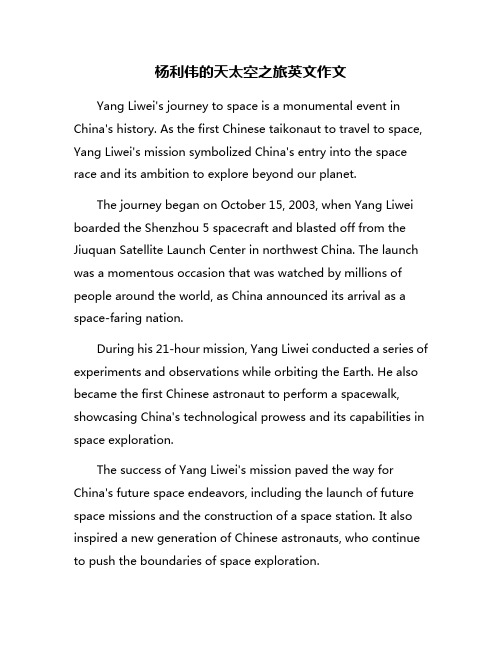
杨利伟的天太空之旅英文作文Yang Liwei's journey to space is a monumental event in China's history. As the first Chinese taikonaut to travel to space, Yang Liwei's mission symbolized China's entry into the space race and its ambition to explore beyond our planet.The journey began on October 15, 2003, when Yang Liwei boarded the Shenzhou 5 spacecraft and blasted off from the Jiuquan Satellite Launch Center in northwest China. The launch was a momentous occasion that was watched by millions of people around the world, as China announced its arrival as a space-faring nation.During his 21-hour mission, Yang Liwei conducted a series of experiments and observations while orbiting the Earth. He also became the first Chinese astronaut to perform a spacewalk, showcasing China's technological prowess and its capabilities in space exploration.The success of Yang Liwei's mission paved the way for China's future space endeavors, including the launch of future space missions and the construction of a space station. It also inspired a new generation of Chinese astronauts, who continue to push the boundaries of space exploration.In conclusion, Yang Liwei's journey to space was a historic moment for China and a significant milestone in the country's space program. His mission demonstrated China's capabilities in space exploration and its commitment to pushing the boundaries of human knowledge. Yang Liwei will forever be remembered as a trailblazer in China's quest to explore the cosmos.。
航天员飞行生活的英语作文
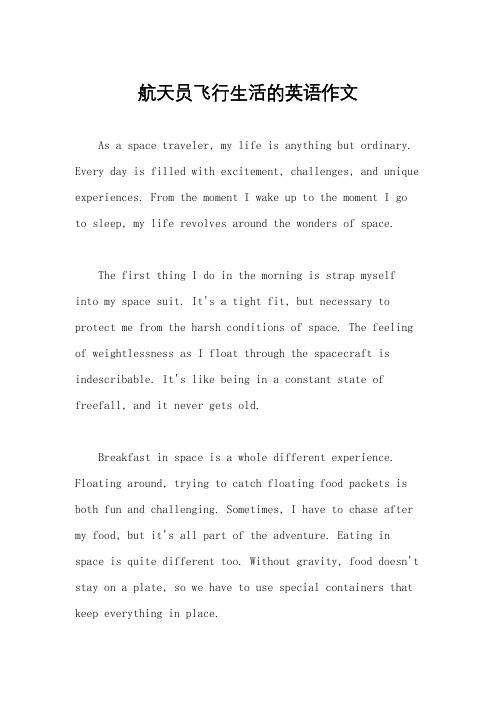
航天员飞行生活的英语作文As a space traveler, my life is anything but ordinary. Every day is filled with excitement, challenges, and unique experiences. From the moment I wake up to the moment I go to sleep, my life revolves around the wonders of space.The first thing I do in the morning is strap myselfinto my space suit. It's a tight fit, but necessary to protect me from the harsh conditions of space. The feeling of weightlessness as I float through the spacecraft is indescribable. It's like being in a constant state of freefall, and it never gets old.Breakfast in space is a whole different experience. Floating around, trying to catch floating food packets is both fun and challenging. Sometimes, I have to chase after my food, but it's all part of the adventure. Eating in space is quite different too. Without gravity, food doesn't stay on a plate, so we have to use special containers that keep everything in place.One of the most incredible things about being a space traveler is the view. Looking out of the window, I see the Earth in all its glory. The colors, the clouds, and the vastness of space are awe-inspiring. It's a constant reminder of how small we are in the grand scheme of things.Living in a spacecraft has its challenges too. Space is a harsh environment, and we have to constantly monitor the temperature, air quality, and other factors to ensure our safety. We also have to exercise regularly to prevent our muscles from deteriorating in the zero-gravity environment.Communication with the outside world is crucial for us. We have regular contact with mission control and our loved ones back on Earth. It's a comforting feeling to know that we're not alone up here and that there's a whole team of people supporting us from the ground.At the end of the day, when it's time to sleep, I float into my sleeping bag and attach myself to the wall. It's a strange sensation to sleep while floating, but surprisingly,it's quite comfortable. The silence and peace of space make for a restful night's sleep.Being a space traveler is a dream come true. It's a constant adventure filled with challenges and breathtaking moments. Every day brings something new and exciting, and I wouldn't trade this life for anything in the world. Spaceis my home, and I'm grateful for the opportunity to explore its wonders.。
太空人英语作文带翻译初中
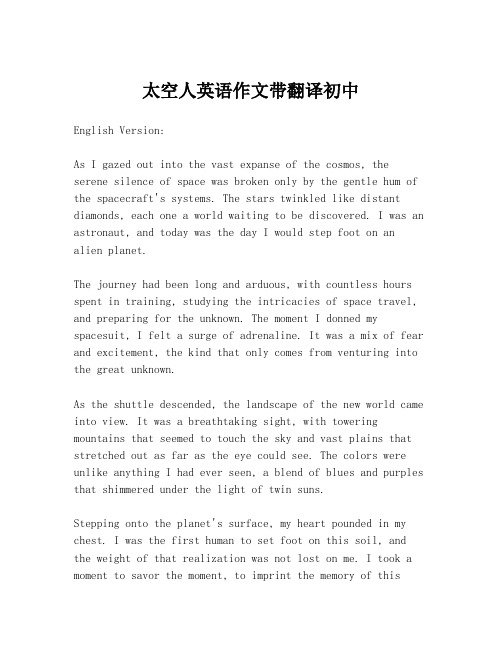
太空人英语作文带翻译初中English Version:As I gazed out into the vast expanse of the cosmos, the serene silence of space was broken only by the gentle hum of the spacecraft's systems. The stars twinkled like distant diamonds, each one a world waiting to be discovered. I was an astronaut, and today was the day I would step foot on analien planet.The journey had been long and arduous, with countless hours spent in training, studying the intricacies of space travel, and preparing for the unknown. The moment I donned my spacesuit, I felt a surge of adrenaline. It was a mix of fear and excitement, the kind that only comes from venturing into the great unknown.As the shuttle descended, the landscape of the new world came into view. It was a breathtaking sight, with towering mountains that seemed to touch the sky and vast plains that stretched out as far as the eye could see. The colors were unlike anything I had ever seen, a blend of blues and purples that shimmered under the light of twin suns.Stepping onto the planet's surface, my heart pounded in my chest. I was the first human to set foot on this soil, and the weight of that realization was not lost on me. I took a moment to savor the moment, to imprint the memory of thishistoric occasion in my mind.I began to explore, taking samples of the soil and rock, documenting my findings, and searching for signs of life. The planet was eerily quiet, but there was a beauty in itssilence that was both humbling and inspiring.As the day drew to a close, I prepared to return to my spacecraft. Looking back at the planet, I felt a sense of accomplishment and wonder. The universe was vast, and we were just at the beginning of our exploration.The journey back to Earth was filled with reflection. Ithought about the stars, the planets, and the mysteries that still lay hidden in the depths of space. I knew that this was just the start of a new chapter in human history, and I was grateful to be a part of it.Translated Version:当我凝视着浩瀚的宇宙,宁静的太空中只有航天器系统的轻柔嗡嗡声。
恒心探星秘的英语作文
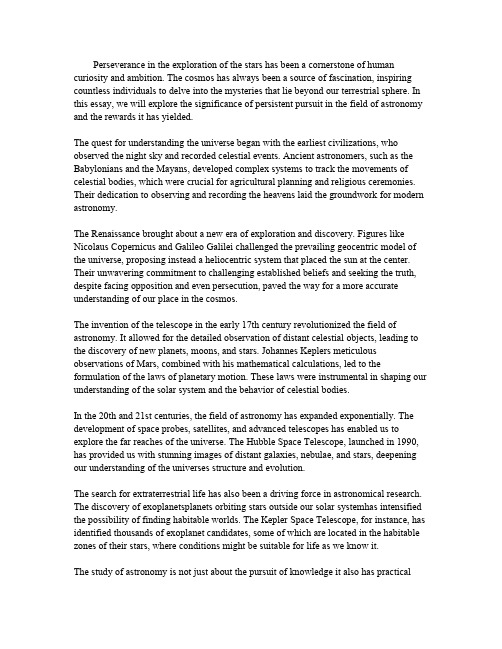
Perseverance in the exploration of the stars has been a cornerstone of human curiosity and ambition.The cosmos has always been a source of fascination,inspiring countless individuals to delve into the mysteries that lie beyond our terrestrial sphere.In this essay,we will explore the significance of persistent pursuit in the field of astronomy and the rewards it has yielded.The quest for understanding the universe began with the earliest civilizations,who observed the night sky and recorded celestial events.Ancient astronomers,such as the Babylonians and the Mayans,developed complex systems to track the movements of celestial bodies,which were crucial for agricultural planning and religious ceremonies. Their dedication to observing and recording the heavens laid the groundwork for modern astronomy.The Renaissance brought about a new era of exploration and discovery.Figures like Nicolaus Copernicus and Galileo Galilei challenged the prevailing geocentric model of the universe,proposing instead a heliocentric system that placed the sun at the center. Their unwavering commitment to challenging established beliefs and seeking the truth, despite facing opposition and even persecution,paved the way for a more accurate understanding of our place in the cosmos.The invention of the telescope in the early17th century revolutionized the field of astronomy.It allowed for the detailed observation of distant celestial objects,leading to the discovery of new planets,moons,and stars.Johannes Keplers meticulous observations of Mars,combined with his mathematical calculations,led to the formulation of the laws of planetary motion.These laws were instrumental in shaping our understanding of the solar system and the behavior of celestial bodies.In the20th and21st centuries,the field of astronomy has expanded exponentially.The development of space probes,satellites,and advanced telescopes has enabled us to explore the far reaches of the universe.The Hubble Space Telescope,launched in1990, has provided us with stunning images of distant galaxies,nebulae,and stars,deepening our understanding of the universes structure and evolution.The search for extraterrestrial life has also been a driving force in astronomical research. The discovery of exoplanetsplanets orbiting stars outside our solar systemhas intensified the possibility of finding habitable worlds.The Kepler Space Telescope,for instance,has identified thousands of exoplanet candidates,some of which are located in the habitable zones of their stars,where conditions might be suitable for life as we know it.The study of astronomy is not just about the pursuit of knowledge it also has practicalapplications.Satellites and telescopes have contributed to advancements in technology, communications,and navigation.Furthermore,the study of celestial mechanics has informed our understanding of the Earths climate and geological processes,as well as the potential threats posed by nearEarth objects,such as asteroids and comets.In conclusion,the unwavering pursuit of knowledge in the field of astronomy has led to remarkable discoveries and technological advancements.From the early observations of ancient civilizations to the sophisticated instruments of today,the human quest to understand the stars has been characterized by perseverance,curiosity,and a relentless drive to explore the unknown.As we continue to push the boundaries of our understanding,we can only imagine the wonders that await us in the vast expanse of the cosmos.。
航天英雄英文作文
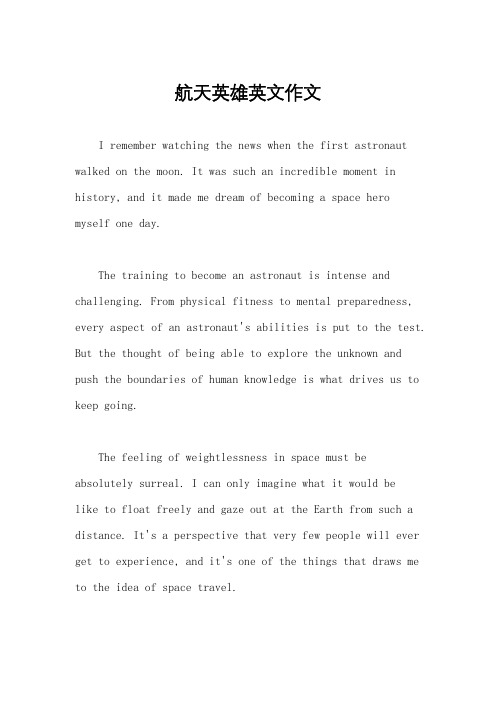
航天英雄英文作文I remember watching the news when the first astronaut walked on the moon. It was such an incredible moment in history, and it made me dream of becoming a space hero myself one day.The training to become an astronaut is intense and challenging. From physical fitness to mental preparedness, every aspect of an astronaut's abilities is put to the test. But the thought of being able to explore the unknown and push the boundaries of human knowledge is what drives us to keep going.The feeling of weightlessness in space must beabsolutely surreal. I can only imagine what it would belike to float freely and gaze out at the Earth from such a distance. It's a perspective that very few people will ever get to experience, and it's one of the things that draws me to the idea of space travel.The risks of space travel are undeniable, but the potential rewards are worth it. Whether it's conducting important scientific research or inspiring future generations to reach for the stars, the impact of space exploration is immeasurable.The camaraderie among astronauts must be incredibly strong. Going through the challenges of space travel and experiencing the wonders of the universe together must create a bond that is unlike any other. I can only imagine the sense of unity and purpose that comes with being part of a space mission.The thought of being able to contribute to the advancement of human knowledge and exploration is what drives me to pursue a career in space travel. The idea of being a part of something so much bigger than myself is both humbling and exhilarating.The sense of awe and wonder that comes with looking out at the vastness of space is something that I can't shake. It's a feeling that I know will stay with me forever, andit's what motivates me to keep pushing forward in my pursuit of becoming a space hero.。
Astronomer'sWife天文学家的妻子

Astronomer'sWife天文学家的妻子天文学家的妻子 by Kay Boyle(1903-1992)当万籁俱寂,生命尚未复苏时,醒来那一刻是令人不悦的。
可此时的女人们,不得不在朦胧中独自开启她日常的新页:调准时针,钟摆便铛铛地敲响,或抬高嗓门,走过每个房间,让生命的脉搏开始跳动。
天文学家的妻子感觉仍有时间继续接下来的工作,该找点儿事儿做,免得让时间白白流逝。
于是,她蹑手蹑脚地下楼去煮咖啡。
她摇摆着双脚,轻轻地踩在椭圆的地毯上,一面做着有节奏的摆臂运动:曲臂,伸直,一面用她柔美的声音哼着:左,左,左,我的妻子和十四个孩子,右,右,右,在灰尘暴土的路中央。
她就是这样,裸露着微颤的双臂,饶有兴致地迎接清晨的到来。
一天就此开始,日复一日,无需有昔日的追忆和怀念,周而复始。
天文学家依然睡着,或假装睡着,而她,一起床,就要行使她家务的主权。
尽管她朝夕面对着那始终无动于衷、让人捉摸不透的冷漠,每日琐碎的家务让她忙着清洁屋子、料理杂务,还得和善待人,一整天下来,她根本无法和丈夫亲密一见。
她的丈夫属于另类的那种,爱做梦的人。
每天他都会在床上逗留几个小时,其余的时间会消磨在屋顶上,用他的望远镜让人费解地观望着天外的世界,要么会沿着小路溜达到街上或闲逛到对面的山上。
与往常一样,这一天先要清理昨夜晚餐剩下的残局,再按着他的要求摆上味道浓重的美乃滋沙拉午餐。
那男人每次都犹如一股新涌起的浪潮,这女人只得顺命地咽下,那男人一贯的沉默示意她该这么做。
年轻的女佣早已听见女主人的声音,不顾时候还早,便上楼,在主人卧室的门槛前站住,通报说:“水管工来了!”天文学家的妻子赶忙披上白色和血红色相间的外套,扣子直系到脖领儿,捂得严严实实的。
她小心地绕过淌满大厅的那滩死水。
“让他上楼来,”她说。
她把手搭在楼梯的扶手上,顺着木梯的方向朝下望去。
“啊,我是艾密斯夫人,”看到水管工往楼上走,她语气温柔地说。
“我是艾密斯夫人,”她边柔声地说着,边缓缓地走下台阶儿。
Astronomer‘swife
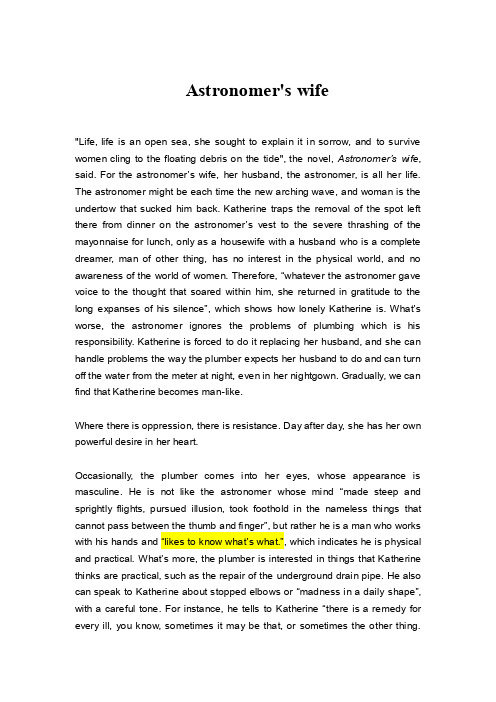
Astronomer's wife"Life, life is an open sea, she sought to explain it in sorrow, and to survive women cling to the floating debris on the tide", the novel,Astronomer’s w ife, said. For the a stronomer’s wife, her husband, the astronomer, is all her life. The astronomer might be each time the new arching wave, and woman is the undertow that sucked him back. Katherine traps the removal of the spot left there from dinner on the astronomer’s vest to the severe thrashing of the mayonnaise for lunch, only as a housewife with a husband who is a complete dreamer, man of other thing, has no interest in the physical world, and no awareness of the world of women. Therefore, “whatever the astronomer gave voice to the thought that soared within him, she returned in gratitude to the long expanses of his silence”, which shows how lonely Katherine is. What’s worse, the astronomer ignores the problems of plumbing which is his responsibility. Katherine is forced to do it replacing her husband, and she can handle problems the way the plumber expects her husband to do and can turn off the water from the meter at night, even in her nightgown. Gradually, we can find that Katherine becomes man-like.Where there is oppression, there is resistance. Day after day, she has her own powerful desire in her heart.Occasionally, the plumber comes into her eyes, whose appearance is masculine. He is not like the astronomer whose mind “made steep and sprightly flights, pursued illusion, took foothold in the nameless things that cannot pass between the thumb and finger”, but rather he is a man who works with his hands and “likes to know what’s what.”, which indicates he is physical and practical. What’s more, the plumber is interested in things that Katherine thinks are practical, such as the repair of the underground drain pipe. He also can speak to Katherine about stopped elbows or “madness in a daily shape”, with a careful tone. For instance, he tells to Katherine “there is a remedy for every ill, you know, sometimes it may be that, or sometimes the other thing.There’s always a help for everything amiss.” He can console her in spiritual way. Opposite, “Mr. Ames would never go down there alive, he like going up”and “On the roof, or on the mountains, he’s been up on the top of them many times.”The word “down”means “down to earth”and represents the astronomer’s wife. “Up”means “mind”contemplation and something impractical and represents the astronomer. Therefore, the astronomer would never go arm-in-arm into earth with his wife anymore. However, the plumber is a man who shares in her feminine world. And then we can see the plumber is women-like.From what I have stated, we can conclude that masculine and feminine qualities are compatible to the plumber and the astronomer’s wife. Katherine shares in the masculine world of the plumber, thus she is androgynous. The plumber possesses feminine qualities and so he is too androgynous. They are androgynous because they share in the positive virtues of each other.In addition, I think it seems like they have been decided by fate. The plumber and Katherine are just like two lambs losing their ways temporarily. They are looking for their happiness through some kind of obstruction and barrier. And just because of the obstruction and barrier, they becomes more suitable each other, as a result of androgyny. Then they complement each other and make a complete union. Their combination becomes one of the most beautiful scene by their androgynous natures.Also from what I have said, the binary opposites have been shown completely. Then I will elaborate it. The novel, "Astronomer's Wife" expresses the conflict between mind and body that expands into opposition between intellect and intuition, contemplation and action, love and denial. The story centers concretely on the relationship between Mr. and Mrs. Ames, the astronomer and his wife, also the astronomer and the plumber. Firstly, Mr. Ames is a solitary dreamer who contemplates an abstract, theoretical world; Mrs. Ames is a woman of concrete, physical animation whose actions reveal a life without reflection, the busy removal of spots from her husband's vest or the thrashing of mayonnaise for his lunch. While the astronomer's deep thoughts have, to hismind at least, reached dignified status, they are so intellectually top-heavy that they remain incomprehensible to his wife. As a result, the astronomer's soaring thoughts "sounded in her in despair" and returned her "in gratitude to the long expanses of his silence" where she withdrew in bewildered self-doubt. And then, as opposed to the astronomer who is man minus man, the plumber is man plus women. The plumber is so practical and physical as well as the astronomer's wife. While the astronomer like going "up" forever, the plumber's favourite is "down".So the characteristics of the astronomer's wife and the plumber are opposite to the astronomer's. And I think this is the meaning of binary opposites.It reminds me of a poet, written by Bian Zhilin, Fragment.You stand upon the bridge to look at the landscape.A landscape view er upon the to wer looks at you.The moon decorates your window.You decorate other people’s dreams.They become the beautiful scenery each other. Finally, the astronomer’s wif e go down with the plumber, stepping into the heart of the earth, holding his arm, and knowing that what the plumber said is true. When you need someone to listen, I'll be there. When you need a hug, I'll be there. When you need someone to hold your hand, I'll be there. When you need someone to wipe your tears, guess what? I'll be there.。
- 1、下载文档前请自行甄别文档内容的完整性,平台不提供额外的编辑、内容补充、找答案等附加服务。
- 2、"仅部分预览"的文档,不可在线预览部分如存在完整性等问题,可反馈申请退款(可完整预览的文档不适用该条件!)。
- 3、如文档侵犯您的权益,请联系客服反馈,我们会尽快为您处理(人工客服工作时间:9:00-18:30)。
First of all,the plot of this novelette,has been fabricated into three parts. The initiation implays the dull and lifeless marital situation while the herorine is of great energy and vigor. However,what a pathetic life the housewife leads lies in the fact that her seemingly philosophical husband is actually a insipid and inconsiderate man. Hence,the sudden incident of acquaintance with the plumber,who is quite considerate,humorous and approachable. This is the very moment that enables her to wake up and to follow her mind in persuit of spiritual freedom. Here,the climax should focus on the denouement of her desision of going underground.
As far as the characters of the novella concerned, Mrs. Ames,the protagonist and also the heroine,is a dynamic round character. Originally,she is an obedient and innocent housewife in the monotonous marrige. Later,she comes to realize that she could change this mode of life style through her own power,especially the appearance of the plumber. Along with her increasingly aching for female freedom and liberation,the transformation of this heroine takes place. The two other figures, astronomers and the plumber,both being the static flat character,are distinctively differenciate from each other. The former one is a unrealistic dreamer which full of illusion and vision. Hence,he could he understood as a foil here. The latter one,however,is a diligent and down-to-earth hero. Besides, the descriptions like "his firm and clean flesh" also highlights the plumber's attractive phisical features.
As for the theme,undoubtedly,should lie in the drastic conflicts between Mrs. Armes' healthy and integrated life style and the realistic life she's leading at present. Given this,the plumber and Mr Armes,stands for the two types of life style,say,sense and sensability. Mrs Armes,initially,as the victim of patriarchy and female discrimination,later awakens as a typical spokesman for the self-dependant and self-reliant female,and eventually,she achieves her femininity through the strengh of her inside struggle and belief. Meanwhile,this short story could be undoubtedly understood as the females' breaking with the past,changing the repressed and eppressed women's fate.。
